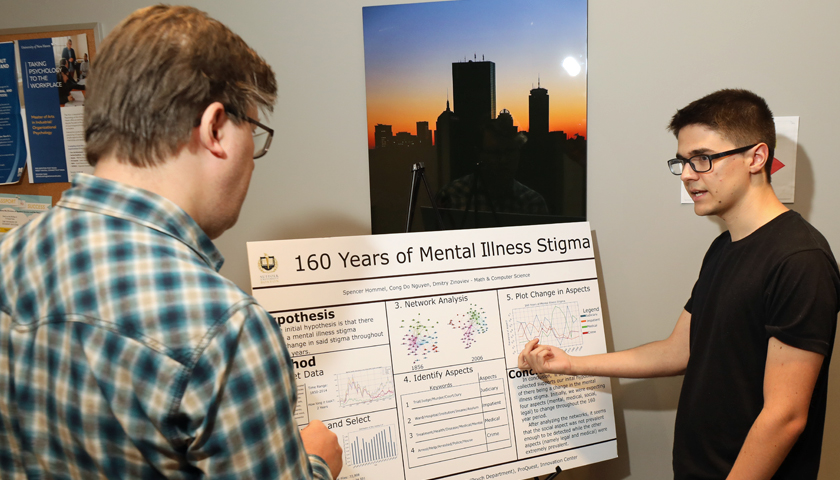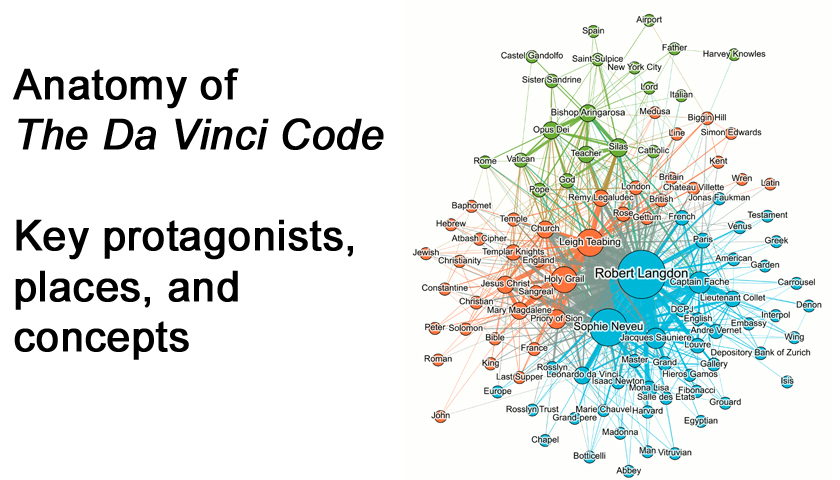A Match Made in Data Heaven

A marriage of computer science and the humanities is offering insights into psychology, film, and other disciplines, with Suffolk students able to analyze intricate texts without reading a single word.
Mathematics & Computer Science Professor Dmitry Zinoviev, who has used data analysis to study subjects as varied as North Korean attitudes about China, online self-injury communities, and friendship in online social networks, is building bridges across disciplines by devising formulas that create revelatory word networks.
Psychology study
Zinoviev’s current data-analysis project, in collaboration with the Psychology Department, looks at changing attitudes about mental illness between 1850 and 2014.
Research assistant Spencer Hommel, Class of 2020, has spent two years harvesting data on mental illness from approximately 75,000 PDF files, using Suffolk’s New York Times database. A natural-language-processing program is used to examine these text files, identifying specific words that relate to mental illness.
“Tapping into language commonly used in reference to mentally ill people, we basically created our own dictionary of terms that are found near ‘mentally ill’ and ‘sickness,’ and from there we constructed a network of words,” said Hommel, an aspiring data scientist who in his freshman year approached Zinoviev and asked to get involved in his research.
By the words used, like asylum compared to hospital, the program categorizes sentence constructions as positive or negative, giving Hommel an understanding of how views of mental illness evolved within the study’s 164-year timeframe.
Stigma diminishes
Through their research, Zinoviev and Hommel discovered wide variation among the mental illness themes linked to their search words. Not only do they find medical mental illness, but also criminal references, revealed through words such as jail, asylum, and penitentiary.
Their data demonstrate that there is now less stigma associated with mental illness than in the mid-1800s, with people once viewed as outcasts now seen as members of society.
“What we’ve really seen so far is that back in the 19th century, mentally ill patients weren’t seen as people, they were usually seen as criminals, and they weren’t treated as patients,” said Hommel.
Wide-ranging collaborations
Zinoviev is engaged in projects not only with Psychology, but also in the departments of Communication & Journalism, Marketing, Business Information Systems & Operations Management, and Theatre.
“Once you start applying networks to disciplines where networks are not traditionally used, you realize there’s so much …that has not been done before because people who do humanities normally don’t know the computational side,” says Zinoviev,”

“The fact that I’m canning together the things that were not to be canned together, and I’m getting something tasty and exciting, this makes me excited,” said Zinoviev.
He is also pleased that finding and processing information comes at a low cost.
“To run my experiment, all I need is my computer and a good Internet connection, which comes for free. Plus my head, which comes for free as well,” Zinoviev said with a laugh.
Finding common ground
The most challenging aspects of his interdisciplinary research are interpreting the results and finding a common language with the other department. The same data may be interpreted differently based on various methods, techniques, and tools in the collaboration. Zinoviev’s main responsibility is to obtain the numbers; the other researcher interprets them.
“There must be some confidence both in me, on their side, and in them, on my side,” said Zinoviev. “They should be confident that the numbers that I obtain are credible, and I should be confident that the way I understand my numbers is consistent.”
He and Professor Monika Raesch, chair of the Communication & Journalism Department, recently submitted a paper about algorithmic evaluation of film adaptation and how a source text should be adapted, based on The Da Vinci Code. The research is focused on using an algorithm, rather than subjectivity, to understand if a certain character actually is required to tell the story in film.
Benefits all around
These research efforts help raise the University’s reputation in the computer science community.
“I think it’s an opportunity,” said Zinoviev. “We are not just a great business school, we are not just a great communication department, we are also a great computer science department and we can do world class research even though we’re a small department.”
As Zinoviev and Hommel prepare to submit their research for publication, Hommel says: “Everyone in Computer Science should be doing these projects. It’s really good experience and it doesn’t only benefit the Computer Science Department but also other departments that may not have this information.”
“Once you start applying networks to disciplines where networks are not traditionally used, you realize there’s so much …that has not been done before because people who do humanities normally don’t know the computational side.”



